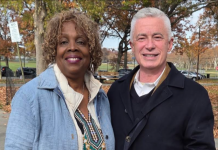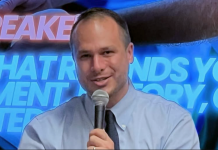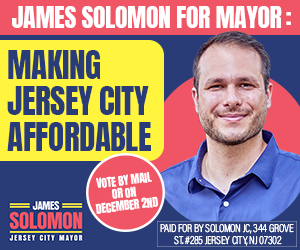A New Jersey grand jury declined to charge a Jersey City police officer who fatally shot Andrew Washington on August 27th, 2023, who was in the midst of the mental health episode and eventually grabbed a knife.
By John Heinis/Hudson County View
After hearing the testimony and evidence – which included a 911 call, body-worn camera footage, witness interviews, and more – the grand jury concluded its deliberations yesterday and voted “no bill,” concluding no criminal charges should be filed against Police Officer Stephan Gigante.
Amelia Green, a partner at Neufeld Scheck Brustin Hoffmann & Freudenberger, LLP, who is representing Courtnie Washington, Andrew’s sister, in the civil case against the city and the police department, said they disagreed with the jury, but highlighted that this is not over.
“We are disappointed by the grand jury’s decision. We must be clear, however—this is not an exoneration of the officers who killed Andrew Washington. We will prove these officers violated Drew’s constitutional rights in multiple ways when they shot and killed him when he was in the midst of a mental health episode,” she said in a statement.
“Drew’s death is the result of ongoing systemic failures by the Jersey City Police Department in its interactions with those with mental health disabilities. The grand jury’s decision only makes the family’s civil rights lawsuit all the more important in holding the Jersey City Police Department accountable for Drew’s death.”
According to the investigation, on Sunday, August 27, 2023, at approximately 2:36 p.m., the Jersey City Police Department arrived at an apartment building on Randolph Avenue in Jersey City in response to a 911 call from Jersey City Medical Center, reporting an emotionally disturbed person alone in his home.
When uniformed officers arrived, they spoke with Washington’s family members outside the home. They explained that a neighbor had called them earlier in the day and reported hearing loud noises and banging coming from Washington’s apartment.
Family members also advised of Washington’s mental health struggles (he was bipolar), that they believed he was off of his medications, and that he needed to go to the hospital.
After being briefed, a sergeant notified his supervisor and also requested that Jersey City Police Emergency Services Unit (ESU) respond to the scene after other police officers and Jersey City Medical Center workers had no success and a crisis interventionist had been contacted.
ESU officers began to arrive at 2:57 p.m. and spoke to family members outside the residence.
ESU Officer Felix DeJesus, who was involved with Washington approximately two weeks prior when he assisted Washington in going to the hospital after a mental-health incident, asked family members about his status.
Family members advised that they did not know because Washington was not willing to speak to them.
ESU officers then entered the apartment building and took over the scene from uniformed officers.
Beginning at approximately 2:59 p.m., ESU Officer Gigante, a trained negotiator, spoke to Washington for approximately a half hour in an attempt to persuade him to come out of the apartment and get help.
Gigante explained to Washington that he was not in any trouble or under arrest and that officers were there to help him and check on his well-being.
During the interaction with Officer Gigante, Washington referred to seeing ghosts and a “suicide mission.” At a certain point, he stopped responding altogether to the officer.
At approximately 3:14 p.m., ESU was given approval to forcibly enter the apartment.
As captured on body-worn camera footage, and later elaborated upon in officer interviews, the decision to enter the apartment was made because they had not heard from Washington for a period of time and were concerned for his well-being.
ESU officers planned to “breach and hold,” meaning that they intended to forcibly breach the apartment door and then pause and assess the situation before making entry.
Prior to breaching the door, Gigante was positioned with a tactical shield at the top of the staircase directly in front of the apartment door with his service weapon drawn.
DeJesus was positioned on a landing outside the apartment door with his CED (taser) drawn. The remaining ESU officers were positioned behind Gigante on the staircase. At 3:28 p.m., Gigante forcibly breached the apartment door.
Washington was standing in the apartment a few feet away from the doorway. Officer Gigante yelled, “He’s got a knife, drop the knife, drop the knife.” Washington advanced toward the officers with a large knife in his right hand as the door was closing.
Washington opened the door, holding the knife, and continued to advance towards the officers. At that time, DeJesus deployed his taser, striking Washington.
Gigante simultaneously fired his service weapon twice, striking Washington, who fell onto the landing at the top of the stairwell. Officers recovered the approximately 13-inch knife next to Washington.
Emergency medical personnel, who had remained outside the residence, rendered first aid at the scene. Washington was then transported to Jersey City Medical Center, where he was pronounced dead at approximately 4:47 p.m.
Recordings of a phone call to police and police radio transmissions, as well as police body camera footage, related to the shooting were previously released, as HCV first reported, with Washington’s family initially asking for more body camera footage to be released.
The incident led to many calls for police accountability after Mayor Steven Fulop and Public Safety Director James Shea were quick to defend the police, though the the grand jury agreed with their perspective.
In January 2024, Gov. Phil Murphy (D) signed a bill into law named for Washington and for Najee Seabrooks, 31, of Paterson, who was also killed during an encounter with law enforcement.
The law established the Community Crisis Response Pilot (CCRT) Program and appropriated $12 million to support eligible grant recipients in six counties.
That funding is being overseen by the Office of Alternative and Community Responses (OACR), formally established in March 2024 by Attorney General MattPlatkin.
OACR was created to help ensure that public health-centered resources and programs are available to law enforcement and their partners in public safety.
Following a competitive grant process, organizations in the cities of Camden, Newark, Paterson, Trenton, and Jersey City were selected to receive grant funds of approximately $2 million each to support the creation of local CCRT Pilot Programs envisioned in the Seabrooks-Washington legislation.
The CCRTs, which include the Jersey City-based Anti-Violence Coalition of Hudson County, are intended to provide on-site community-based intervention such as outreach, de-escalation, stabilization, and resource connection for individuals who are experiencing a behavioral health crisis.
These pilots add to and complement the response options currently available through the Department of Law and Public Safety, the Department of Health, and the Department of Human Services, including ARRIVE Together, the Community-Based Violence Intervention and Hospital-Based Violence Intervention Programs.
To that end, Jersey City announced they would be participating in the ARRIVE Together program in October.
“The core of this is that the system is broken for those who need it the most. We (you) watch these decisions unfold in front of us and then we expected to pick up the pieces and just move forward and continue to fight! This is extremely frustrating to watch,” exclaimed AVCHC Executive Director Pam Johnson, who is also running for city council in Ward A.
Furthermore, in August 2024, in an attempt to improve the outcomes to encounters between police and barricaded individuals, particularly those who may be experiencing behavioral, mental health or substance use related crises, Platkin announced changes to the statewide use-of-force policy.
For example, when dealing with a barricaded individual, police are required to contact designated tactical teams – which include trained crisis negotiators – to respond to the scene, ensuring that these incidents are handled by highly trained and equipped units.
Editor’s note: This story was updated with a comment from Amelia Green, counsel to Courtnie Washington, Andrew’s sister, and Anti-Violence Coalition of Hudson County Executive Director Pamela Johnson – also a Ward A council candidate.









